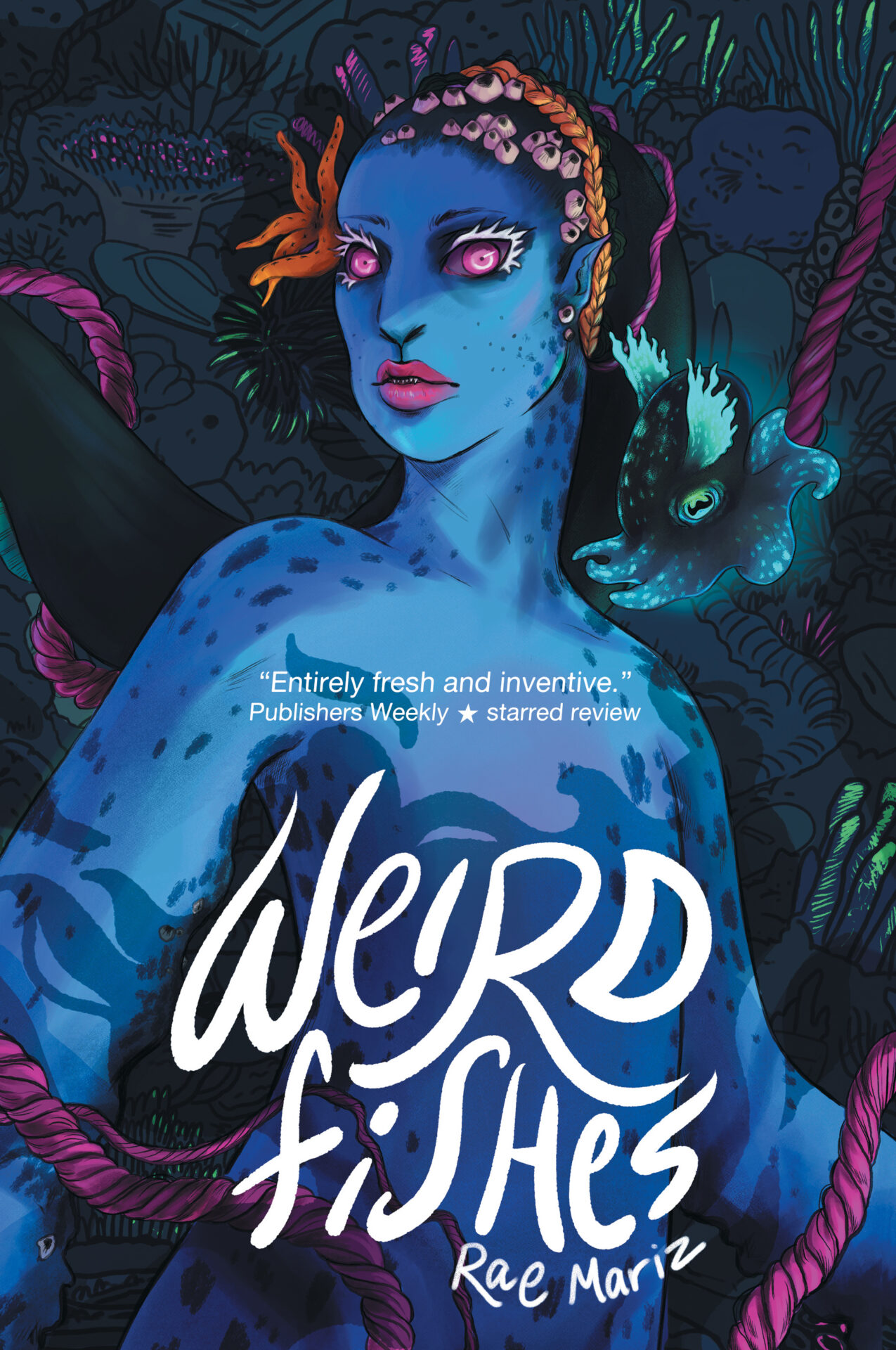
Rae Mariz is joining us today to talk about her novel, Weird Fishes. Here’s the publisher’s description:
AN UNDERWATER TALE OF FRIENDSHIP AGAINST MONSTROUS ODDS When Ceph, a squid-like scientist, discovers proof of the ocean’s slowing currents, she makes the dangerous ascent from her deep-sea civilization to the uncharted surface above. Out of her depths and helpless in her symbiotic mech suit, Ceph relies on Iliokai, a seal-folk storyteller, who sings the state of the sea and has seen evidence of clogged currents as she surfs the time gyres throughout the lonely blue. Navigating the perils of their damaged ocean environment, and seemingly insurmountable cultural differences, Ceph and Iliokai realize that the activities of terrestrial beings are slowing the spiralling currents of time. On a journey that connects future and past, the surface and the deep, the unlikely friends struggle to solve a problem so big it needs a leviathan solution.
What’s Rae’s favorite bit?

Rae Mariz
I’ve mentioned elsewhere how much I enjoyed twisting the “first contact” science fiction narrative into something gloriously unrecognizable. How much fun it was to create Ceph’s octopus-ish “alien” culture in a way that exposes some of the absurdities in human assumptions that we’re the dominant species on planet Earth, and how much I relate to the hybrid marine mammal “mermaid” character Iliokai.
But my favorite bit—the thing that I’ve been the most geekily excited to discuss since the book’s release—has also been the thing that feels like I’m not allowed to talk about. It’s never hinted at in reviews, but it’s what friends text me about when they finish reading. It’s the super spoiler. The big reveal. The triumphant ending. I’ve had to bite my tongue and coyly allude to what lives in the unexplored ocean depths, but man oh man, we’re breaking all taboos here because it’s time. We’re going to acknowledge the existence of The Mother.
I don’t think it ruins the story to know she’s down there. I knew she was waiting at the ending before I even started drafting, but I was still surprised when I got there, encountering her alongside Ceph and Iliokai while writing the scene. She is the ultimate “alien consciousness”… what I always hope to get a glimpse of when reading this kind of speculative science fiction! The incomprehensible mind of something nowhere near human. And unlike other stories about space exploration and the deep sea, where the “fear of the unknown” is tangled into the genre, The Mother reveals that the monstrous unknown in the deep is not something to inherently fear. It can be something unfathomable but awe-inspiring. Something we might never understand, but that doesn’t make it an enemy.
Also, I’m not sure The Mother should be considered “alien” when she’s the most native being, the literal land and sea we live on and with. I’d first read about the Gaia hypothesis when I was like 16 or 17. Basically, the theory goes that “living organisms on the planet interact with their surrounding inorganic environment to form a synergetic and self-regulating system”. I’d interpreted that to mean that the planet behaves like a body—and I’m not sure if this is a part of James Lovelock’s original theory or if I misremembered something I read—but if you look at a pregnant human body and the changes it undergoes during the natural course of childbirth, then based on those symptoms and abnormal readings, a doctor could make the assumption that the patient was dying. Tumorous and without hope. I played with that idea as I witnessed twenty years of environmental changes. Yeah, it looks bad. The planet could be dying, but what if it’s just pregnant? And this is the terrible rough patch before it gives way to something new?
Which led me to think of the Earth not only as a body, but as a mother. The Mother. I’ve long had this conception of a living planet, partly based on those early readings about the Gaia hypothesis and also because I just never grew out of seeing life in the animate and inanimate and their interactions. A pragmatic animist. It’s harder for me to believe we live in a purely mechanistic universe. But if I was going to give “Mother Nature” a face—also an extremely anthropocentric exercise to insist on life/beings having “a face”—I needed to submerge all that underwater. The imaginings of Gaia have always been very land-and-air centered due to, you know, people who do the imagining being most familiar with land and air. But on a planet with 71% of its surface covered with water, of course this planetary being has most of its “body” and processes located underwater; its heart in the molten center of the planet, a respiratory system felt in currents and tides.
By the end and through that exhilarating encounter with The Mother, I hoped to leave a person who’d made it all that way through our intense ocean voyage with a renewed understanding of what it means to be a part of an ecosystem. Push back against the modern narrative that humans are or have ever been apart from/outside of a community of living organisms and non-living structures. And just preserve that reverence for the unfathomable.
LINKS:
BIO:
Rae Mariz is a speculative fiction storyteller and cultural critic. Her writing inhabits the ecotone between science fiction and fantasy, and features characters finding family with others who live in the gaps between. She’s the author of The Unidentified and co-founder of Toxoplasma Press. Find her work at raemariz.com and on Twitter @raemariz.
